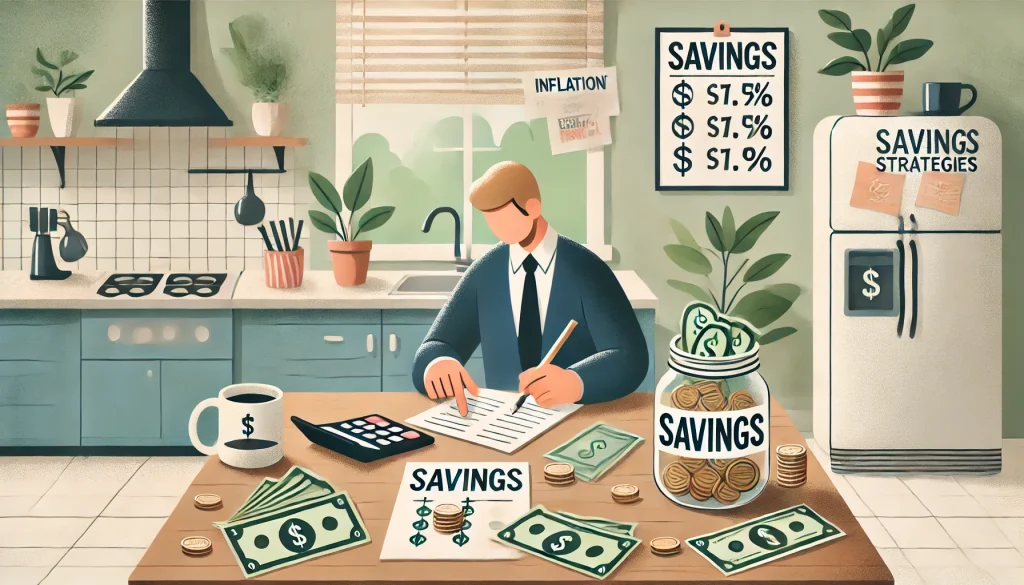In challenging economic times, financial prudence becomes more critical than ever. Inflation, a common economic phenomenon, can erode purchasing power, making effective financial planning essential for maintaining one’s standard of living. This blog post explores practical methods for saving money when the cost of living rises. By implementing these strategies, Americans can safeguard their finances and continue to work towards their long-term financial goals.
Every individual can find themselves feeling the pinch when prices for goods and services climb, as inflation erodes purchasing power and tightens household budgets. During such times, it’s essential to reassess financial habits and explore alternative approaches to managing money. Let’s delve into some actionable strategies that can enhance your financial resilience and help you maintain stability during inflationary periods.
Understanding inflation and its impact on household expenses

To navigate the financial strain brought on by inflation, it’s vital to first understand how it affects daily expenses. Inflation fundamentally increases the price of goods and services, meaning the value of money decreases. As prices climb, the same dollar buys less than before, putting pressure on household budgets. Households can notice the effects in various aspects, including grocery bills, utility costs, and transportation expenses.
When inflation is high, it can lead to a decrease in discretionary income, leaving less room for savings or investments. Therefore, being aware of these shifts is the first step towards creating a robust financial strategy. Beyond the immediate impact on expenses, inflation can also affect long-term financial planning. Understanding these broader implications can help individuals and families adjust their financial priorities and develop more sustainable financial behaviors.
Reassessing monthly budgets
One of the primary steps in combating inflation is to revisit your monthly budget. This process involves evaluating current income and expenses and identifying areas where adjustments can be made. Start by listing all sources of income and then categorize expenses to gain a clearer picture of spending habits. When reevaluating your expenses, separate needs from wants. Essential expenses such as housing, utilities, and groceries should be prioritized. In contrast, non-essential expenditures, like entertainment and dining out, might be areas where cuts can be made to free up funds for savings or emergencies. By routinely updating and maintaining a budget, you can ensure that your spending aligns with your financial goals, making it easier to adapt to economic changes without compromising essential needs.
Embracing frugal living
Another effective strategy during inflationary periods is adopting a frugal lifestyle. This doesn’t mean cutting out all pleasures, but rather finding smarter and more cost-effective ways to enjoy life. Simple changes in daily habits can lead to significant savings over time. Consider shopping for generic brands, which often offer the same quality as name-brand items but at lower prices. Embrace the art of couponing and look for sales and discounts to reduce grocery and household expenses. Additionally, reducing energy consumption by turning off lights and unplugging devices can lower utility bills. Implementing small, mindful changes in your routine can culminate in substantial savings. Frugal living enriches one’s financial resiliency, allowing more leeway to navigate economic uncertainties.
Maximizing income during inflation
Beyond cutting costs, increasing income is another effective approach to counteract the effects of inflation. Finding ways to boost your earnings can create additional sources of revenue to supplement your primary income. For some, this might mean pursuing part-time work or freelance opportunities. The gig economy offers flexible options in various fields, providing avenues to leverage skills and hobbies into additional income streams. Online platforms can also be valuable in connecting with clients and projects. Investments are another avenue to consider. While risky, strategic investments can potentially outpace inflation and grow wealth over time. However, it’s important to research thoroughly and perhaps consult financial experts to mitigate risks involved with investments.
Pursuing continuing education
Investing in education and skills development can also be a strategic way to boost earnings. Enhancing your skill set can increase your marketability and open up opportunities for promotions or new, higher-paying job roles. Many online courses and certifications are available, allowing individuals to learn at their own pace and achieve their educational goals quickly. Employers often value up-to-date knowledge and skills. Taking the initiative to learn new technologies or methodologies relevant to your industry can provide an edge in the workforce. Upskilling also empowers individuals to pivot their career paths if desired, providing greater control over job prospects. Engaging in continuous learning is not only beneficial for personal growth but also as a protective measure against inflation’s financial pressures by potentially increasing potential earning power.
Exploring passive income streams
Establishing passive income sources is another sound financial strategy when dealing with inflation. Passive income can provide financial leverage without requiring constant, active work input, helping to reinforce financial stability over time. While building passive income streams requires initial effort and potentially financial investment, once established, they can contribute to financial security. Diversifying income sources can alleviate reliance on a single paycheck and provide a financial cushion in turbulent economic times.




